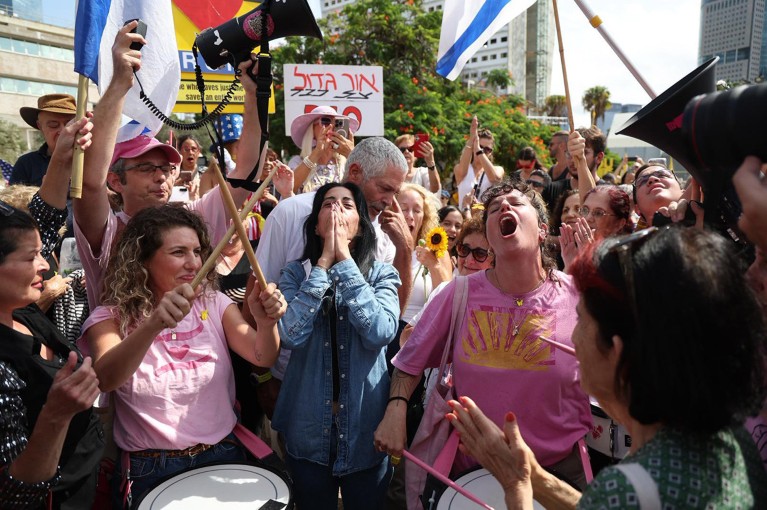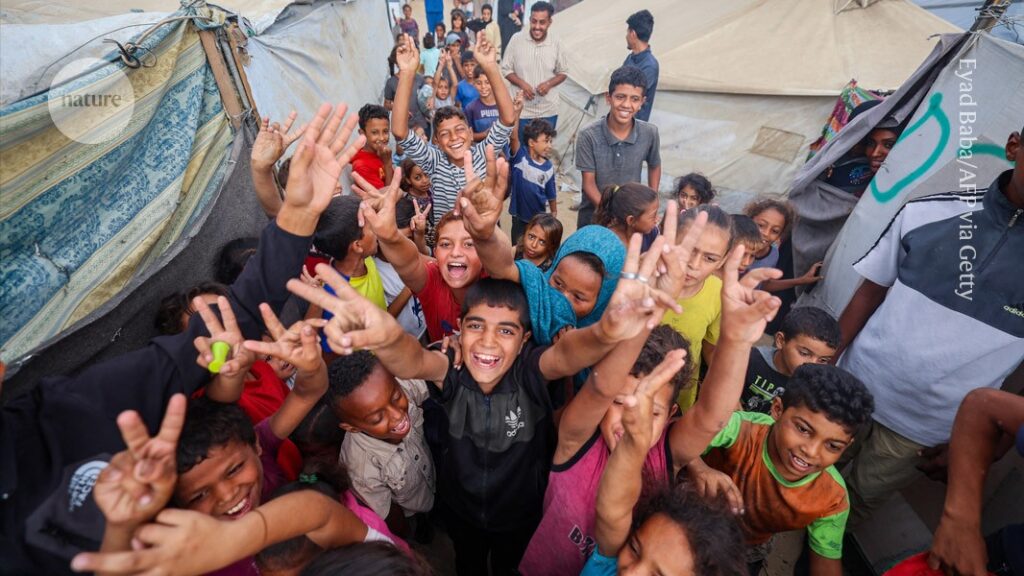Researchers who study post-war reconstruction have told Nature that the recovery of public health, environment, higher education and research in Gaza will not succeed unless it is led by experts from the Palestinian territory.
Their warning comes amid images of jubilant scenes in Gaza yesterday as negotiators in Egypt sealed the first phase of US President Donald Trump’s ceasefire plan, which today was ratified by Israel’s cabinet.
Israel’s bombardment and ground offensive, which has killed more than 67,000 people, began soon after the Hamas attacks of 7 October 2023, in which 1,200 people were killed and 251 were taken hostage.
Under Trump’s plan, Hamas is expected to disarm, release the remaining hostages and play no part in Gaza’s governance. Israel’s government will suspend military action, withdraw its forces to an agreed position, free a number of Palestinian people it is holding in captivity, allow more aid into Gaza and permit United Nations agencies to operate in the territory. The precise details of how all this will be implemented have not been announced.
“We woke up [yesterday] morning to happy, long-awaited news. There are so many celebrations here in Gaza right now,” says Farid Al-Qeeq, a researcher in urban planning and former president of Gaza University.
The researchers Nature interviewed for this article say it’s important that reconstruction is led by Palestinian communities. They are voicing these concerns now because Palestinian organizations have not been named as having a leadership role in Trump’s plan.
Since the first attacks, Israel’s troops have almost completely destroyed Gaza’s physical infrastructure — including hospitals, other health-care facilities and water and sanitation.
By the end of August, a time when there were severe restrictions to aid getting through, more than half a million people were experiencing famine, the Famine Review Committee, an independent group of experts, concluded. Nearly 55,000 children below the age of five — are acutely malnourished, according to data published in The Lancet on 8 September1.
Source: Ref. 1
More than 2,200 medical and education personnel have been killed, according to data published by the Palestinian Central Bureau of Statistics based in Ramallah in the West Bank. Almost four-fifths of higher-education campuses have been damaged or destroyed, and 88,000 students at those institutions have been forced to put their studies on hold, according to the UN’s science agency UNESCO, based in Paris.
“It’s important to understand the enormity of the scale of destruction”, says Savo Heleta, a researcher at Nelson Mandela University in South Africa who studies post-conflict higher education and aid flows to Palestinian universities. In a yet-to-be published paper, Heleta estimates that the war has damaged at least US$222 million worth of higher-education infrastructure. Rebuilding, he says, would need nearly five times that, at around $1 billion, because of the cost of clearing debris and removing unexploded bombs.
Heleta also says that if past trends are a guide to the future, then “countries from the Gulf and Turkey are likely to be the main donors” for reconstruction. He adds that in previous years, aid for universities amounted to a maximum of just $20 million per year.
Amani Al-Mqadma, head of international relations for the Islamic University of Gaza, and a co-author of ‘Resilience in the rubble’, a report assessing the needs of higher education in Gaza, says that the territory’s priorities extend beyond physical reconstruction. They must also include sustaining online education until physical spaces are rebuilt; mental-health support for students and staff; and reconnecting researchers to the world through conferences, visits and scholarships. Because higher-education institutions in Gaza rely mostly on income from tuition fees, Al-Mqadma calls for aid to cover students’ fees to keep universities alive.
Let Palestinians lead
Gaza’s scientific institutions should be crucial partners in the reconstruction efforts, says Al-Mqadma, who is currently based at the University of Edinburgh, UK. “These academics possess unparalleled local knowledge and a deep understanding of their land.” Moreover, “decisions about the region’s future must be informed by extensive input from the communities who will be most affected”, adds Naomi Rintoul-Hynes, a soil scientist at Canterbury Christ Church University in the UK, who is studying the environmental impact on Gaza of the war.

People gather in Hostages Square in Tel Aviv on 9 October to celebrate the ceasefire agreement to end the war in Gaza.Credit: Saeed Qaq/Anadolu via Getty
Under Trump’s plan, a “technocratic” committee of Palestinian and international experts will be appointed to run public services. It will be under the oversight of an international body of decision makers, likely at the level of heads of government and called the Board of Peace. The board will be chaired by Trump and will include former UK prime minister Tony Blair.
Sultan Barakat, a public policy researcher at Hamad Bin Khalifa University in Qatar, says many respected academics will not participate in the committee if it turns out to be “the management of an occupation”.
“There will be a lot of questioning around this committee”, says Barakat, who is co-author of a report, ‘Gaza: leadership and reconstruction for the day after’, published last year.

